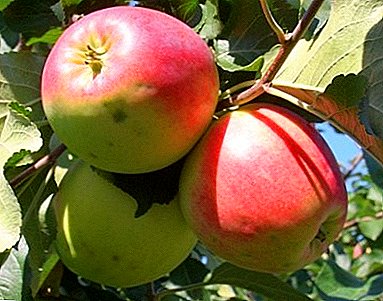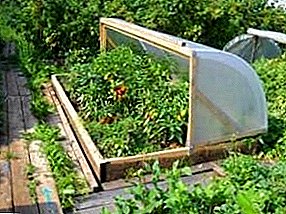 Cherry - the most common garden culture in our latitudes. The Caucasus and Crimea are considered to be the birthplace of this tree. It is unpretentious, grows in any conditions, including in the stony district. However, the best conditions for growth and fruiting are fertile soils and wetlands.
Cherry - the most common garden culture in our latitudes. The Caucasus and Crimea are considered to be the birthplace of this tree. It is unpretentious, grows in any conditions, including in the stony district. However, the best conditions for growth and fruiting are fertile soils and wetlands.
Thanks to the work of plant breeders, cherries can have a different taste and color of fruits, its varieties differ both in the strength of the growth of the tree and in terms of fruiting.
Did you know? To have a good harvest, you need to choose frost-resistant and self-bearing species.
Vladimirskaya
This variety is known long ago. More than three centuries ago, our ancestors were harvesting this cherry. For such a long time this fruit has several varieties - you can meet both two-meter bushes and four-meter giants. In addition, in the collective farms of the last century, it was Vladimirskaya cherry that occupied the main part.  The yield of this variety is no different. Its fruits are small (up to 3.5 g). but the taste of these fruits allows you to successfully use them as a dessert. Vladimir's cherry is good both fresh and processed. Suitable for drying and freezing.
The yield of this variety is no different. Its fruits are small (up to 3.5 g). but the taste of these fruits allows you to successfully use them as a dessert. Vladimir's cherry is good both fresh and processed. Suitable for drying and freezing.
Harvest cherry tree gives in the third year (cherries ripen by mid-July) after planting.
Cherry Vladimirskaya well tolerates even severe frosts, so it has long been zoned in various regions. However, at -30 ° C, the kidneys may suffer, which will have a bad effect on the future harvest.
The main drawback of Vladimirskaya Cherry is insufficient (according to modern standards) resistance to fungi.
Important! Since this type of cherry belongs to the self-fruitful, pollinators should be nearby. Sweet cherry is considered a good pollinator.
Baby girl
If you choose a cherry for the garden early, pay attention to the baby. This tree grows up to two meters in height (rarely - a little higher).  Harvest can be collected at the end of June. Fruits are dark red, large (5-6.5 g), juicy, their appearance is estimated by gardeners for a solid top five. The stone is easily separated from the pulp. Cherries are beautifully transported. The baby is frost-resistant, has a high resistance to fungi.
Harvest can be collected at the end of June. Fruits are dark red, large (5-6.5 g), juicy, their appearance is estimated by gardeners for a solid top five. The stone is easily separated from the pulp. Cherries are beautifully transported. The baby is frost-resistant, has a high resistance to fungi.
A meeting
Many consider this cherry to be the leader in the list of the best varieties. The meeting was made by Melitopol breeders by crossing Amateur and Kievskaya-19 cherries.
The tree itself grows up to 2.5 meters, has a spherical, thick, slightly drooping crown. The first harvest can be collected in the third year after planting. From an adult tree, you can harvest up to 25 kg. Maturing term - the end of June.  The meeting is highly resistant to drought, fungi and frost.
The meeting is highly resistant to drought, fungi and frost.
Its fruits are quite large - 9 g (under favorable conditions - 15 g), brilliant, bright red. Taste - standard, cherry, dessert pulp. It belongs to partially self-fertile varieties and needs pollinating neighbors.
Early
Gorgeous cherry, pleasing its flowering in early spring and delicious, large dark red fruits in summer. Ripens very early - in the second decade of June, gives a good harvest.
The strength of tree growth is medium. Differs in frost resistance, tolerates drought well.
Purple
This variety was obtained by crossing cherries Shubinka and Vladimirskaya in the 60s of the last century. Differs in ripeness and quality fruits.
The height of an adult tree is small - a maximum of 2 meters. Crohn - rounded, dense. The leaves are small, elongated-oval.  The purple blossom begins early and the crop yields by mid-July. At the same time, the fruits of it reach 3.7 g. The cherries themselves are round, dark red, distinguished by a sweet, slightly sourish taste. Stone difficult to separate. Not bad tolerates frosts, has resistance to fungi.
The purple blossom begins early and the crop yields by mid-July. At the same time, the fruits of it reach 3.7 g. The cherries themselves are round, dark red, distinguished by a sweet, slightly sourish taste. Stone difficult to separate. Not bad tolerates frosts, has resistance to fungi.
Did you know? Large-fruited cherry trees are more resistant to diseases, and they also produce a good harvest.
Chocolate girl
Chocolate variety cherries were bred recently, in 1996, by crossing Black and Livskaya consumer goods varieties.
The tree is low, rarely growing up to 2.5 meters. Crohn back pyramid thick.  Chocolate burgundy fruits, almost black, large (3.5 g). To taste - sweet and sour, with a slight bitterness, reminiscent of cherries.
Chocolate burgundy fruits, almost black, large (3.5 g). To taste - sweet and sour, with a slight bitterness, reminiscent of cherries.
This variety begins to bloom in May and the crop yields by mid-July. The first harvest can be collected in the fourth year of the tree. It is a self-fertile crop, but for a better crop, a pollinator neighborhood is desirable.
Chocolate can do a long time without watering, resistant to drought, fungi and frost.
Important! This variety does not tolerate waterlogging and shading, so the direct rays of the sun are necessary for the development of the tree and a good harvest.
Hydrangea
 There are controversies about the origin of this variety: the Belgians are credited with breeding themselves, and the French consider Hortense their offspring. Be that as it may, this cherry, belonging to early varieties, quickly spread throughout the continent.
There are controversies about the origin of this variety: the Belgians are credited with breeding themselves, and the French consider Hortense their offspring. Be that as it may, this cherry, belonging to early varieties, quickly spread throughout the continent.
The fruits of Hortense are oval-truncated, one-caliber (tied alone or in pairs). The skin of cherries is shiny, red, easily removed from ripe fruits. The flesh is tender, juicy, sweet, with a slight sourness.
The crop is removed in a half-ripe state in mid-June.
Hydrangea is considered a capricious crop: in some conditions it produces little fruit, and sometimes it can make you happy with the yield. The yield mainly depends on the soil and the area in which these trees grow. Greater yields are given in relatively dry ground and on elevations. Ideal areas - Dagestan and Kazakhstan.
Shpanka Donetsk
Ukrainian variety. Tree with a spherical crown, vigorous. Shpanka is undemanding to the soil and bears fruit practically on any site.  The tree has good frost resistance, is relatively resistant to fungi. Begins to bear fruit in the fourth year after disembarkation. The fruit of the speckle average (5 g), red, sweet and sour, ripen in late June.
The tree has good frost resistance, is relatively resistant to fungi. Begins to bear fruit in the fourth year after disembarkation. The fruit of the speckle average (5 g), red, sweet and sour, ripen in late June.
Important! On poor soil without top dressing Shpanka can hurt.
Expectation
Refers to the early ripening varieties, the crop of which is removed in late May. Differs in the increased productivity. Waiting fruits are dark red, suitable for any kind of processing.
Early dessert
 Cherry Early dessert - ultra early (mid-June) variety with large (5-6 g) fruits of bright red color. Productivity from a tree can reach 20-25 kg.
Cherry Early dessert - ultra early (mid-June) variety with large (5-6 g) fruits of bright red color. Productivity from a tree can reach 20-25 kg.
The flesh of the fruit of the Early Dessert is tender, with a sweet-sour taste. The crop is well transported and preserved. Trees of this variety have an average resistance to fungi, rust, drought, and tolerate frosts well.
All varieties of cherries are divided into 2 groups:
- Moreli - with darker fruits and bright juice;
- amorely - with light fruit and clear juice.












